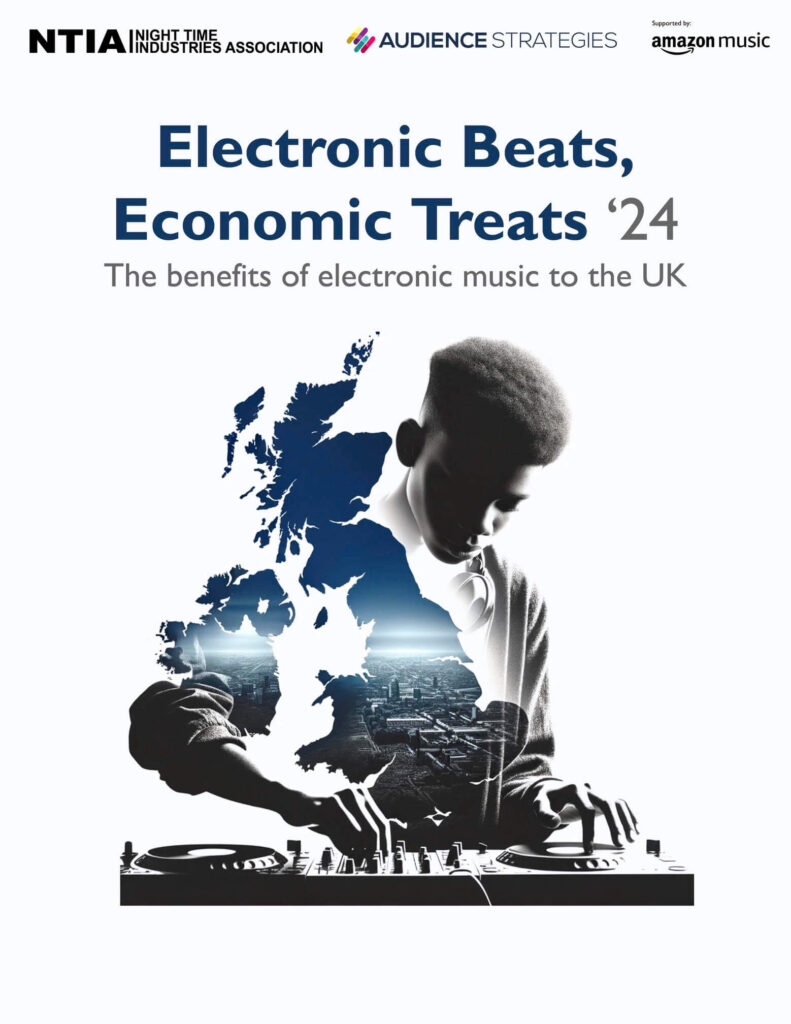Unveiling the Latest Insights into the UK’s Electronic Music Industry
After the success of the first ever UK Electronic Music Industry Report, the NTIA presents ‘Electronic Beats, Economic Treats 2024’ in collaboration with Audience Strategies and supported by Amazon Music, highlighting the cultural vibrancy, economic significance, and evolving trends within the sector.
The second annual report aims to fully understand the economic contribution and the cultural significance of the electronic music industry to the UK economy and presents a comprehensive overview of the electronic music scene, from the energy of the dance floor to the creativity within recording studios, celebrating the diverse talent propelling the industry. The report will also cover the sector’s economic contributions, including recorded music, music publishing, and the vibrant live scene encompassing concerts, events, and festivals, plus new analysis into the perspectives of the audiences that make up the electronic music scene.
This year’s findings highlight the industry’s significant contributions and the evolving trends shaping our national economy.
Key Highlights from the 2024 Report:
- Digital Dominance: Electronic music’s impressive rank as the second most popular genre on the UK’s digital music platforms.
- Festival Frontiers: The genre’s lead with 30% of artists at UK festivals, surpassing other genres in popularity and presence.
- Global Recognition: The UK’s esteemed position as the third-largest host of electronic music festivals worldwide.
- Artistic Influence: The overwhelming influence of electronic music on 73% of the top 30 global artists.
- Fan Engagement: The daily listening habits of 80% of UK fans, underscore the genre’s broad appeal and emotional impact.
Economic Contributions:
The report meticulously outlines electronic music’s £2.5 billion impact on the UK, detailing the dynamics of nightclubs, festivals, concerts, and recorded music sectors. Despite a slight decrease, the industry shows resilience and growth in key areas.
Delving Deeper:
“Electronic Beats, Economic Treats 2024” goes beyond the numbers to explore the narratives, trends, and case studies that paint a comprehensive picture of the industry’s influence and innovation.
Before You Dive In:
For a comparative perspective, take a moment to download and review “Electronic Beats, Economic Treats 2023.”
Explore the Latest 2024 Insights
Unlock exclusive access to ‘The Second UK Electronic Music Industry Report’ by entering your email address.
Crucial findings from the report include:
- 2nd: Electronic music’s rank amongst genres in the UK on digital music services, including YouTube and Shazam.
- 30% of artists at UK festivals are electronic artists, leading other genres! (Next is Rock at 22% and pop at 21%).
- 3rd in the world for the festivals containing electronic music. The UK hosts 300, featuring around 19,500 artists.
- 73% of the top 30 global artists are significantly influenced by electronic music.
- 80% of UK electronic music fans listen to the genre daily, including 75% of those aged 45 and over.
- 80% experience emotional and mental health benefits at electronic music events.
- 79% of women and 87% of men believe the electronic music scene promotes diversity and inclusivity.
- 70% of respondents view dance / electronic events as centres of creativity and innovation.
Economic analysis:
- £2.5 billion is the total measurable impact of electronic music on the UK, across recorded music, nightclubs, festivals, and concerts, experiencing a 6% decrease from the previous year. Driven by:
- -4%: The number of GB nightclubs decreased 4% from 882 in 2022 to 875 in 2023. A net loss of 31.
- 90.0m visits were made to nightclubs for electronic music, indicating a 9% decline.
- £1,457.3m was contributed by nightclubs to the economy, a 14% decrease.
- £210.6m was generated from recorded music, an increase of 16%.
- £567.8m was the economic contribution from festivals, up 9%.
- £285.5m came from other live electronic music events, reflecting a 5% increase.
Beyond the numbers, the ‘Electronic Beats, Economic Treats 2024’ report dives into the narratives that defined 2023, uncovers emerging trends for 2024, and celebrates the sector’s influencers through insightful case studies.
Michael Kill, NTIA CEO Says:
“This report invites you to embark on a journey through the pulsating heart of the UK electronic music scene. From the pioneers who laid the groundwork to the emerging talents shaping its future, each note, each beat, is a testament to the enduring cultural value of electronic music in the United Kingdom. As we navigate the vibrant landscape of sound and culture, let us celebrate the resilience, talent and sense of community that define this extraordinary musical movement.”
“What truly sets the UK electronic music scene apart is its sense of community. Beyond the pulsating beats and infectious melodies lies a collective spirit that unites individuals from diverse backgrounds. This community transcends borders, bringing together people who share a passion for the transformative power of electronic music. It is a space where differences are celebrated, and the universal language of beats and rhythms creates a sense of belonging that knows no bounds.”
David Boyle Audience Strategies:
“Electronic music might seem like just another genre (or worse!). But this research shows it is SO MUCH more. It is a thriving community, a sizeable economic contributor, and a hotbed of creativity and innovation. Electronic music is a story of resilience, diversity, and richness that rivals any other cultural force. It energises spirits, unites diverse communities, and pushes creative boundaries. Its impact permeates boardrooms and pop charts, movie studios and fashion houses, high streets and homes. But the report shows it is also an industry at a crossroads, facing immense challenges … yet, fortunately, equipped with the ingenuity and passion to innovate.”
Maria May, Head of Electronic Music/Senior Agent CAA:
“Electronic music continues to be a driving force globally, and the UK has played a pivotal role in its development. The report explores the economic and cultural impact of electronic music, highlighting its contributions to job creation, tourism, and community well-being.”
“It also sheds light on the challenges faced by the industry, providing insights for future growth. As we continue to champion electronic music’s potential, this report serves as a powerful tool for collaboration, innovation, and advocacy. In order to continue to grow we need to support each other and the culture of dance music. Together, let us propel electronic music to new heights in the UK and beyond.”
Sacha Lord is the Night Time Economy Adviser for Greater Manchester and co-creator of the Parklife festival and The Warehouse Project:
“As an ardent advocate for the electronic music genre, I am compelled to delve into the profound impact it has had on the cultural landscape of the United Kingdom. Electronic music is not merely a collection of beats and melodies; it is an immersive journey that transcends boundaries, weaving itself into the fabric of our society and leaving an indelible mark on the lives of countless individuals.”
“Electronic music is not just a genre; it is a cultural phenomenon that has woven itself into the very fabric of the UK’s music scene. Warehouse Project and Parklife festival, as torchbearers of this sonic revolution, exemplify the genre’s ability to captivate, inspire, and unite. As we celebrate the undeniable success of these events, let us also recognise the enduring value of electronic music in shaping the collective narrative of our society.”
Carly Heath is the Night Time Economy Advisor for Bristol
“Dancing as a community is a joyful human tradition, as old as time. Anyone who regularly seeks the skin-tingling sensation of dancing in front of a sound system will understand the value of electronic music to their lives. Nothing matches those moments of bodies in motion, palms and arms in the air, repetitive beats moving dancing feet.”
“Dance spaces are community places. They are a unique feature as ‘beacons of joy’ on our high streets. Clubs are a unifying public place to explore identity, connect through culture, and reset bodies and minds at the end of a stressful week. Dance spaces deserve celebration for their significant contribution to British Culture, yet the financial support and public funding for our culture is woefully inadequate. I’m hopeful that future generations will recognise club culture as a British cultural institution. The government should better support the scenes of today to create the legendary artists of the future.”
Wez Saunders, CEO & Co-Owner, Defected Records:
“Electronic music holds significant importance in the UK, serving as a cultural, economic, and social pillar. It has been instrumental in shaping the UK’s nightlife and music scene, contributing significantly to the economy through festivals, clubs, and music sales. Electronic music has fostered community and identity among fans, promoting inclusivity and innovation. Its global appeal has also enhanced the UK’s international reputation as a leader in music production and live events, making it a key player in the worldwide music industry.”
“This comprehensive report, spearheaded by Michael Kill and the NTIA and crafted by David Boyle of Audience Strategies, delves into the significant economic and cultural footprint of the UK’s electronic music industry. It assesses the genre’s impact on the national economy, community well-being, and cultural landscape, exploring its popularity from grassroots venues to global stages. The document identifies challenges, proposing strategies for sector support, providing further understanding of the sector to the Government aiming to illuminate the industry’s value, advocate for educational and infrastructural development, and foster a more inclusive and supported electronic music community.”
While the primary aim is to highlight the electronic music industry’s value, underline its importance, and pinpoint both the challenges it faces and the opportunities it offers, the report also highlights the need for funding mechanisms for artists and DJs and bolster support for grassroots venues and promoters, the role of education in securing the industry’s future, the effects of gentrification, licensing, and zoning on the sector and the unique role of electronic music nightclubs in cultivating community, inclusivity, and tolerance.
Electronic music continues to electrify the UK’s cultural and economic landscape, albeit with nuanced shifts in its trajectory over the last year. The genre’s increasing popularity, as evidenced by its leading presence in festival line-ups and its substantial share of the UK singles revenue, speaks to its enduring appeal and its role in enriching the UK’s cultural landscape. The shift towards smaller, more intimate festival experiences and the notable increase in festival attendance highlights a community seeking meaningful connections through music. Furthermore, the global influence of UK electronic music, illustrated by artists like Calvin Harris commanding significant international airplay, reinforces the UK’s influential position on the world stage.
However, the industry faces challenges, marked by a 6% decrease in its total measurable economic impact, now calculated to be £2.5 billion. Since the start of the pandemic, 396 nightclubs, or 32%, have been lost. In the last year alone, we lost 31 nightclubs (4%), and nightclub visits for electronic music saw a 9% decrease, reflecting broader trends affecting nightlife and social spaces which underscores the pressing need for strategic interventions to preserve and promote these vital cultural arenas.
Despite these hurdles, the report reveals a resilient and vibrant community, with 97 million nights out enjoyed based on electronic music over the last 12 months. The engagement with electronic music also extends beyond mere listening, profoundly impacting social connections, community building, and individual well-being. The fan survey highlights the genre’s role as a vital catalyst for inclusivity and mental health benefits, with 80% of respondents experiencing emotional and mental health improvements through dance and electronic music events. These gatherings are not just entertainment venues but community hubs, where 75% of attendees feel a sense of belonging, underscoring the genre’s ability to foster strong social bonds and ability to promote wellbeing and enhance community cohesion. The genre’s events are celebrated for promoting diversity, inclusivity and serving as hubs for creativity and community building. Notably, 98% of clubbers feel safe in club environments, indicating the significance of these spaces beyond mere entertainment.
In conclusion, while facing economic contractions and challenges in maintaining physical spaces for music, the UK’s electronic music scene continues to thrive culturally, fostering a strong sense of community and innovation. Electronic music continues to be a pivotal force in the UK, shaping not only the economy but also the cultural and social fabric of the nation.
Addressing the challenges facing the sector requires a multifaceted approach, including easing regulatory pressures, enhancing financial support mechanisms, and championing the UK as a prime destination for electronic music. Encouraging community engagement, bolstering electronic music education, and tackling issues of gentrification and redevelopment are crucial steps towards sustaining the industry’s growth and vibrancy. The path forward for electronic music in the UK is not without obstacles, but with concerted effort and strategic support, its future remains as promising and impactful as ever.
The report was commissioned by the NTIA and written by David Boyle of Audience Strategies, an agency that uses data to help artists and brands to understand their audiences and trends.




